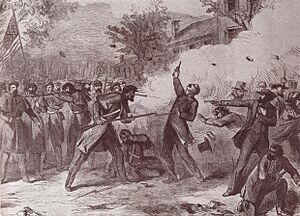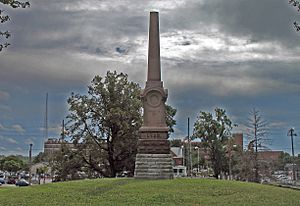Camp Jackson affair facts for kids
The Camp Jackson affair was an important event during the American Civil War. It happened on May 10, 1861, near St. Louis, Missouri. At this time, Missouri was a "slave state," meaning it allowed slavery, but it was trying to stay neutral in the war between the Union (the northern states) and the Confederacy (the southern states).
During this event, a group of Union soldiers captured a state militia unit. This militia was training at a place called Camp Jackson. The Union commander, Brigadier General Nathaniel Lyon, believed this militia was secretly planning to help the Confederacy. He thought they would attack the federal arsenal in St. Louis, which was a place where the U.S. government stored weapons.
After capturing the militia, General Lyon marched them into St. Louis to release them. But as they walked, angry crowds gathered. An accidental gunshot led to Lyon's soldiers firing into the crowd. This tragic event killed at least 28 people and injured many more. Several days of unrest followed in St. Louis. The violence only stopped when the military took control of the city.
General Lyon's actions helped the Union keep control of St. Louis and Missouri for the rest of the war. However, it also made the disagreements within Missouri much worse. Many people who had wanted Missouri to stay neutral now had to choose a side.
Contents
What Happened at Camp Jackson?
The Build-Up to the Conflict
In 1861, the United States was divided. The northern states formed the Union, and the southern states formed the Confederacy. Missouri was a border state, meaning it was between the North and South. It had enslaved people but also strong ties to the Union. Many Missourians wanted their state to remain neutral and not join either side.
However, both the Union and the Confederacy wanted control of Missouri. St. Louis was a very important city because it had a large federal arsenal. This arsenal held many weapons and supplies.
General Lyon's Concerns
General Nathaniel Lyon was the new Union commander in Missouri. He was very loyal to the Union. He worried that Missouri's governor, Claiborne Jackson, and the state militia were secretly supporting the Confederacy.
Lyon learned that the state militia was holding a training camp called Camp Jackson, just outside St. Louis. He suspected they were planning to raid the federal arsenal. He also believed they were receiving secret help from the Confederacy.
The Capture of Camp Jackson
On May 10, 1861, General Lyon decided to act. He led his Union volunteer soldiers to Camp Jackson. They surrounded the camp and captured the entire state militia unit without a fight.
The March and the Tragedy
After the capture, Lyon began marching the captured militia members into St. Louis. He planned to release them after they promised not to fight against the Union. As the soldiers and their captives moved through the city, large crowds gathered. Many people in the crowd were angry and supported the Confederacy.
During the march, an accidental gunshot occurred. It's unclear exactly what happened, but this shot caused Lyon's soldiers to fire into the crowd. This tragic moment led to the deaths of at least 28 civilians and injured many others.
Aftermath and Impact
The Camp Jackson affair caused several days of unrest and rioting in St. Louis. Many wealthy citizens left the city. The violence finally ended when military law was put in place. This meant the military took control of the city and kept order. Union soldiers were also sent to help calm the situation.
Changes in Missouri's Government
The day after the Camp Jackson affair, the Missouri General Assembly passed a "Military Bill." This bill created a new state military force called the Missouri State Guard. It also gave Governor Jackson a lot of power over the state. Union supporters believed this bill was a step towards Missouri joining the Confederacy.
General William S. Harney, another Union commander, tried to make peace. He signed an agreement with Sterling Price, the commander of the Missouri State Guard. This agreement, called the Price-Harney Truce, allowed the federal military to control St. Louis. It let the State Guard keep order in the rest of Missouri.
However, many Union supporters in Missouri did not like this agreement. They felt it gave too much power to those who wanted to leave the Union. They asked President Abraham Lincoln to remove Harney.
Lyon Takes Full Command
Frank Blair, a strong Union supporter and a leader from St. Louis, was given permission by President Lincoln to replace General Harney. On May 30, Blair replaced Harney with General Lyon. Lyon was then put in charge of all Union forces in Missouri.
The Meeting at Planter's House
On June 11, General Lyon met with Governor Jackson and Sterling Price in St. Louis. They argued for hours about the governor's powers under the new Military Bill. Lyon ended the meeting by saying he would never let Missouri dictate to the U.S. government. He declared, "This means war."
The War Begins in Missouri
After the meeting, Governor Jackson returned to the state capital, Jefferson City. General Lyon quickly sent Union troops by steamboat to Jefferson City. Jackson fled west with his State Guard troops.
Lyon's men took control of the capital without a fight. They then chased Jackson's forces. On June 17, Lyon's troops defeated the State Guard at the Battle of Boonville. Governor Jackson and some of his supporters escaped to southwest Missouri. This left most of the state under Union control.
Later, a special meeting of Missouri's leaders declared the governor's office empty because Jackson had left. They appointed Hamilton Rowan Gamble, a Union supporter, as the new governor. President Lincoln's government recognized this new government.
Why It Mattered
The Camp Jackson affair was a turning point for Missouri. Before this event, many Missourians wanted to stay neutral. But the violence forced people to choose sides.
Several factors played a role in this event:
- Nativism: Some people had strong feelings against immigrants, especially German immigrants, who made up many of the Union volunteers in St. Louis.
- Trust in Government: There was a lot of mistrust between state and federal governments.
- Slavery: People had strong feelings about whether slavery should continue or end.
- States' Rights: This was the idea that states should have more power than the federal government.
After the Camp Jackson affair, many people who had tried to stay neutral became strong supporters of the Confederacy. This included former Governor Sterling Price. The incident showed that Missouri would not be able to avoid the Civil War.
 | Victor J. Glover |
 | Yvonne Cagle |
 | Jeanette Epps |
 | Bernard A. Harris Jr. |



